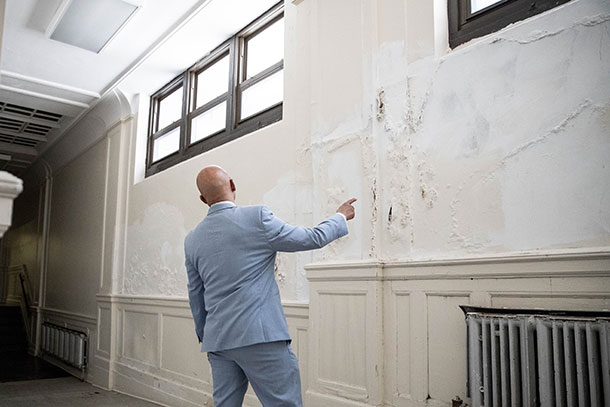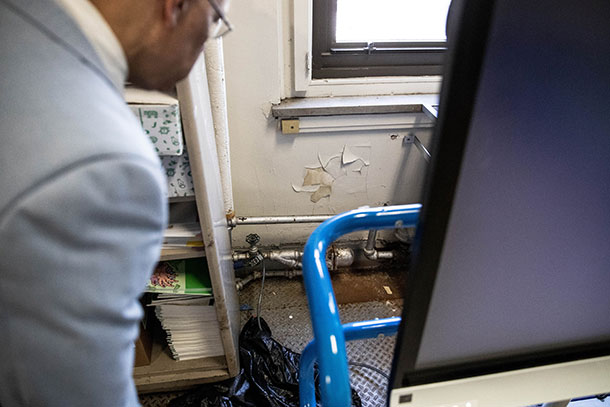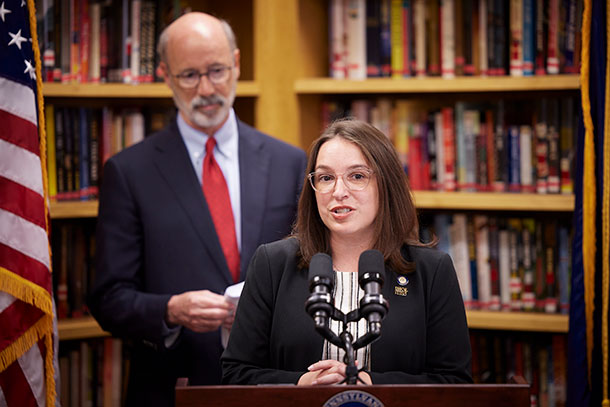Education
Public school advocates warn lawmakers: ‘Don’t stall;’ fix the broken system now
Following the major court ruling regarding the state’s school funding system, lawmakers have some complicated equations to solve.

State Senator Vincent Hughes is pushing two proposals that he says would fix toxic conditions in public schools. JAMES ROBINSON/PENNSYLVANIA SENATE DEMOCRATS
Faced with a historic lawsuit over the constitutionality of how the state’s public schools are funded, Pennsylvania’s Commonwealth Court assigned the state’s political leaders a little bit of homework: Fix the system.
In a 778-page ruling released on Feb. 7, the Commonwealth Court ruled that the lawsuit’s respondents – the legislative and executive branches – “have not fulfilled their obligations to all children under the Education Clause in violation of the rights of Petitioners.”
That clause in the state constitution, President Judge Renée Cohn Jubelirer wrote, requires the state to provide a “comprehensive, effective, and contemporary system of public education.” That standard is not currently being met in the eyes of the court, she said.
The court did not impose any requirements or mandates of its own, instead deferring to legislators and Gov. Josh Shapiro to come up with a fix that makes Pennsylvania’s “constitutional promise a reality in this commonwealth.”
Now comes the hard part – figuring out how to do that.
“The court has not established any kind of framework for a remedy,” Donna Cooper, the executive director of Children First, said at a Capitol press conference shortly after the court handed down its decision. “It is up to the lawmakers in this building to figure out. Do they want to be in this fight every year? Or do they want to deliver for the children of the commonwealth? That’s really the decision in front of them.”
The suit was filed in 2014, when six school districts, along with parents and other organizations, sued leaders in the General Assembly and the governor’s office, arguing that the respondents failed to provide poorer school districts with the resources “sufficient to enable the districts to ensure that all students, including the Individual Petitioners, have an opportunity to obtain an adequate education.”
Put simply, their claim was that school districts throughout Pennsylvania are underfunded and, as a result, are unable to provide a quality education equally throughout the state.
They asked the court to declare the state’s education funding system to be unconstitutional, alleging that it does not comply with the state constitution’s Education Clause, which states that the “General Assembly shall provide for the maintenance and support of a thorough and efficient system of public education to serve the needs of the commonwealth.”

They also alleged that the current system of funding public schools violates the state constitution’s Equal Protection Clause.
Petitioners included the William Penn School District, the Greater Johnstown School District, the School District of Lancaster, the Panther Valley School District, the Shenandoah Valley School District and the Wilkes-Barre Area School District.
During the course of the proceedings, the petitioners presented testimony from a number of subject-matter experts, and also provided academic performance data. One set of data presented by the petitioners showed that around 38% of the 800,000 students across the state in grades 3 through 8 were unable to reach proficiency in English and literature-focused standardized tests from 2015 to 2019 – meaning some 300,000 children didn’t reach baseline.
The number for math and algebra tests was even higher, with nearly 500,000 students in the same cohort unable to score a “proficient grade,” according to evidence submitted by the petitioners.
The physical condition of various schools was also raised. Officials from the School District of Philadelphia testified the district had 42 facilities that were more than 100 years old.
The opinion notes that “leaks and water intrusion are a common condition among the district’s aging buildings,” and referenced a 2019 site visit to Randolph Technical High School in North Philadelphia that revealed that a leak in the roof led to water pooling up on the floor inside of a student lab space with electrical, welding and other repair equipment.
At the Panther Valley School District in Carbon and Schuylkill counties, Superintendent David McAndrew testified that the district’s elementary school building is in “rough shape.”
“It’s awful. It’s awful that our kids are in that kind of an environment,” McAndrew said. He detailed cracks in cement and said the roof “constantly leaks,” leading to water damage, per the ruling.
The elementary school also has few bathrooms, forcing 75 kindergartners to share one toilet and two urinals. Testifying on the facility issues, McAndrew said “there’s just no money to (fix) that.”

Based on an estimate from Penn State professor Matthew Kelly, advocates say roughly $4 billion will be needed to make up for adequacy shortfalls at 428 of the state’s school districts.
But will lawmakers and Shapiro be able to agree on a plan to do that? Thus far, lawmakers have largely been mum on how they might move forward.
State Senate Majority Leader Joe Pittman, an Indiana County Republican, said in a statement that both the legislative and executive branches should “thoughtfully and thoroughly examine all aspects of our education system.
“While meaningful changes cannot happen overnight, we acknowledge there is a need to evolve our approach to school funding to ensure fairness for our students,” Pittman said.
House Republican Leader Bryan Cutler took a strong stance against the court’s decision, saying the “decision is disappointing, but not surprising from a state judiciary that consistently identifies itself as a legislature to reach policy gains political allies cannot achieve in the General Assembly.”
Cutler added that “problems existing in our public education system go well beyond funding,” and said that “declining test scores during periods of record state funding have consistently demonstrated that money alone cannot educate students.”
Nate Benefield, senior vice president at the right-leaning think tank the Commonwealth Foundation, said school choice policies, such as state-funded scholarships that would allow students living in a low-achieving school district to enroll in private schools, distance learning programs and other curriculums, should be an option explored by lawmakers.
He pointed to states like Iowa and Utah as examples of how Pennsylvania can expand school choice. Iowa Gov. Kim Reynolds signed legislation last month that allows any family in the Hawkeye State to use taxpayer funds to pay for private school tuition, while Utah established a universal school choice program of its own in January.
“I think that is the path forward and the model that Pennsylvania needs to get to,” Benefield told City & State.
Shapiro, who has been a proponent of public school funding and school choice, expressed support for the GOP-backed Lifeline Scholarship proposal on the campaign trail last year. In a statement, Shapiro said he believes that every child “should have access to a high-quality education and safe learning environment, regardless of their ZIP code.”
“My administration is in the process of thoroughly reviewing the Commonwealth Court’s opinion and we are determining next steps,” the governor said.
Yet, some say school choice policies shouldn’t even be a part of the public school funding conversation right now.
State Sen. Lindsey Williams, a Democrat from Allegheny County who is the minority chair on the Senate Education Committee, said the focus should remain on funding the state’s public schools – not diverting students away from them.
“The court said you are unconstitutionally underfunding public education, and if you were to fully and fairly fund education, every student would have access to the education they need,” Williams said in an interview with City & State. “You wouldn't be pulling it out and sending it to privately run public charter schools or private schools.”

Williams said she hopes that lawmakers will gather with school districts, educators and administrators to chart a path forward. She said the state has multiple options at its disposal to come up with the money needed to ensure that districts have adequate funding.
She highlighted reforming payments to charter schools, taxing large entities like UPMC and even dipping into the state’s Rainy Day Fund to get closer to that $4 billion number. “There are plenty of places for us to go to look at the revenue that advocates and the court have said you need to adequately fund education,” she said.
Ask anyone with skin in the game about the timeline for addressing the commonwealth’s school funding conundrum, and you’ll get a similar answer: It’s going to take time.
Williams said she expects it to take more than one budget cycle for the education funding system to be reimagined, and Benefield shared that viewpoint. “It starts with the governor's budget address – what he proposes and then fleshing out what they do this year, but I don't expect any sort of end product this year,” he said. “I'd be surprised if some grand, major, transformative reform happens in the next four months, but we'll wait and see.”
Progressive public school advocates also worry that lawmakers will kick the can down the road by forming a task force or commission to examine the issue further. “I suggest they don’t stall. I think the first important thing is not to find stall tactics, whether they’re appeals or new commissions,” said Cooper.
“The data is very clear how much the school districts need based on the methodology that the legislature themselves designed in 2008,” she said.
